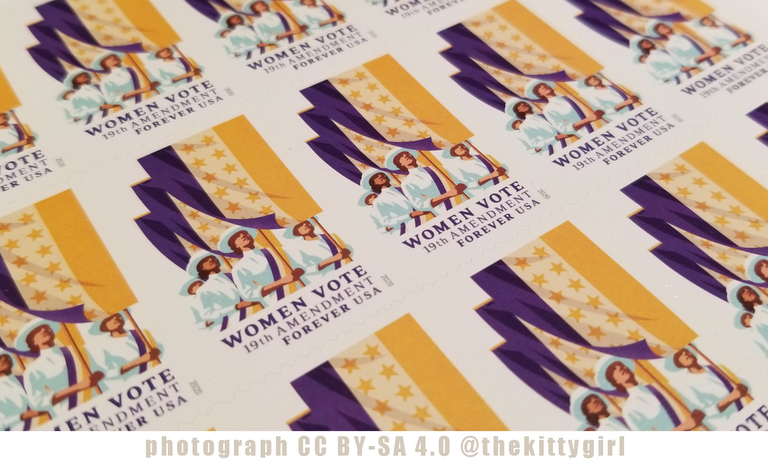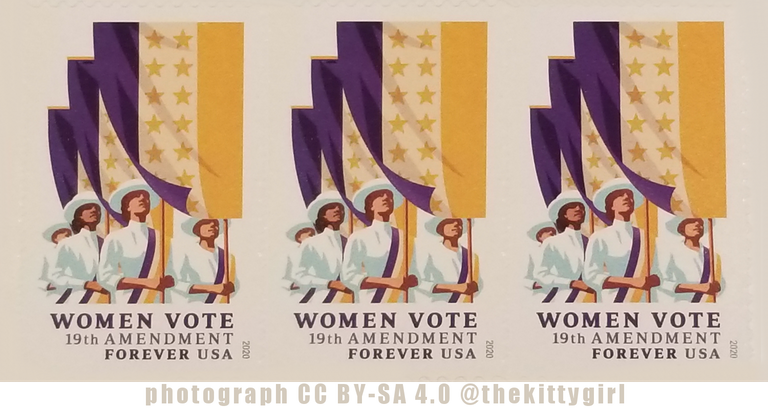Most of my bills are now paid online, but I still regularly send things via the postal service. Many of my family still receives birthday cards from me each year, and there is always the occasional sympathy card when someone passes. In fact, I mailed a sympathy card just yesterday to one of my cousins whose husband passed away from a heart attack.
Postage stamps with flowers and other pretty things have always appealed to me, and are usually my first choice. When my supply of postage stamps began to run low recently, however, I wasn't as fond of the selection of flowers available on the postal website. But, I saw a design that celebrated the hundredth year of the passage of the 19th Amendment granting voting rights to women, so that's what I chose.
Traditionally, the US Postal Service released First Class stamps each year with a set price marked on them which reflected the costs of mailing a one-ounce letter. Every few years, inflation dictated that postal rates increase, so new stamps were released with a new price on them. If consumers had old stamps at the time, additional stamps in smaller denominations had to be purchased and affixed to the letter to total the requisite amount of postage necessary.
Then, in 2007, the first stamp with "Forever" imprinted on it was released, and it guaranteed that the stamp was valid for a one-ounce, First Class letter to be mailed, even if prices increased in the future! No longer did consumers have to double-up on stamps to meet the required amount to mail a letter! They became so popular that "Forever" stamps became the norm. That is why these stamps have the word "Forever" on them instead of a monetary denomination. (I include this information mostly for the benefit of readers in other countries that might have postal systems that handle things differently. But, it can also serve as a historical reference for young people born in recent years who never knew anything but the "Forever" stamps.)

It astounds me that in the 244 years the US has existed, only for the past 100 have women been allowed to vote. 😞 Both of my grandmothers were born in the 1800s, one in 1891 and the other in 1895, so one of them was 25 and the other 29 before they gained the right to vote. I was able to vote when I became of age, as was my mother. But, I am amazed that I actually knew someone in real-life from a previous generation that did not have that option when she became of age.
Many centuries B.C.E., societies existed that were either matriarchal or where women enjoyed equal status with men, such as in the ancient Çatalhöyük in Anatolia.[1] Then, patriarchal societies conquered those egalitarian societies and have reigned supreme in most parts of the world since, fueled by religions that denigrate women. Conservative thinking of those patriarchal societies asserted that women were lesser than men, leading to the sad truth that women were denied many basic rights that men enjoyed. Even after the founding of the US in relatively modern times, many conservatives actually argued that the The Declaration of Independence's wording: "...that all men are created equal..." is only referring to males, not mankind in general. 🙄
In the late 1700s, the state of New Jersey briefly allowed women to vote if they owned property, but rescinded that right in the early 1800s. Many other states did not even allow women to own property. Kentucky was unique in allowing all women over the age of 21 to vote if they owned property and paid taxes. This right included all women, regardless of race. [3]
In the 1840s, women in America were reaching out for greater control of their lives. Husbands and fathers directed the lives of women, and many doors were closed to female participation. State statutes and common law prohibited women from inheriting property, signing contracts, serving on juries and voting in elections. Women's prospects in employment were dim: they could expect only to gain a very few service-related jobs and were paid about half of what men were paid for the same work. [source]
Then, in an era in which women "...were often not allowed to speak in public," [2] several women decided to hold their own convention and talk amongst themselves. That historic event was the Seneca Falls Convention and took place in 1848. This convention and the Declaration of Sentiments document that was produced there was the spark needed to begin a very long road to gaining basic rights for women.
Small advances were made soon after the convention. For instance, the state of New York passed legislation that allowed women to retain ownership of property brought by them into a marriage, rather than that property becoming owned by her husband. Furthermore, women then began to retain ownership of any property acquired by them during the marriage. The state of Pennsylvania soon followed the legislative actions of New York regarding women's owning property. However, no voting rights nor anything more was granted in either state.
Life was much different in other places, though. As one example, of many:
In 1862 the Chief Justice of the North Carolina Supreme Court denied a divorce to a woman whose husband had horsewhipped her, saying, "The law gives the husband power to use such a degree of force necessary to make the wife behave and know her place." [3]
Then came the Emancipation Proclamation and the Thirteenth Amendment in 1865 which abolished slavery. Not only did this amendment abolish slavery, but it also created an indirect setback for the cause of women's' suffrage. There were men who finally had softened somewhat to the idea of allowing their wives and daughters to vote, but were against the idea of allowing any woman-of-color to vote. So, these small-minded men decided against supporting women's' suffrage, altogether. Thankfully, however, not all men were so conservative in their thinking, but they were in the minority.
Between 1865 and 1870, three new amendments were ratified to the US Constitution as a part of the Reconstruction after the Civil War. Among those three amendments was the Fifteenth Amendment which "prohibits the federal government and each state from denying a citizen the right to vote based on that citizen's race, color, or previous condition of servitude." [source] So, this amendment granted voting rights to all males regardless of race, but still kept women in a state of exclusion, as women were not considered "citizens."
In 1869, a husband and wife attempted a different approach which came to be known as a the New Departure. They argued that the Constitution and its amendments referred to "All persons..." in various places, which certainly should include women, logically — even if a woman wasn't considered a "citizen," then she was a "person," at least. The national suffrage movements urged women to attempt to vote and to file lawsuits if their attempts failed. In one such lawsuit which was filed in a US District Court in Washington, DC, the judge ruled that allowing women the right to vote would be "destructive of civilization" [3] and the case was promptly dismissed. Destructive of civilization...? Really...? 😳
In a tangential strategy, another woman petitioned Congress to agree that the Constitution's wording "implicitly enfranchised women" to vote. The congressional committee who heard that petition denied her request. [3]
The infamous Susan B. Anthony was actually arrested for attempting to vote in 1872. In her subsequent trial, the court refused to allow her to speak during the proceedings, which was a terrible miscarriage of justice. Only after a verdict of "guilty" was delivered by the jury (at the judge's order, which was a compounded miscarriage of justice) was Anthony allowed to speak. She delivered the most famous speech in history for the cause of women's suffrage, but public opinion still held against it.
In 1878, a friend of Susan B. Anthony, senator Aaron A. Sargent, introduced a bill into Congress to grant voting rights to women but the bill did not pass. It was reintroduced every year for the next forty years before it finally passed — a full 72 years after the Seneca Falls Convention.
Once the proposed Nineteenth Amendment finally passed through Congress successfully, it began to be ratified by the states, one-by-one, slowly. to become law. Tennessee became the 36th state to ratify it on August 18, 1920, making the law effective throughout the union. "Thus the 1920 election became the first United States presidential election in which women were permitted to vote in every state." [3]
Sadly, there are many conservative thinkers that still believe women never should have been given the right to vote, do not deserve equal pay as men for the same work, should not hold public office, and a host of other things to which males are entitled. It's shocking that many downtrodden women have also been brainwashed to believing these things, too. I have actually heard conservative women complaining in recent years about the "hoodlums" called suffragettes who marched on Washington in the early 1900s in a effort to overturn the "natural order" of women being lesser than men.
I am truly astonished that in a land where freedom is supposedly valued, that it would take one-hundred forty-four years of struggle to grant such a simple freedom to a significant percentage of the population. It demonstrates a mindset that believes in "freedom for everyone who is like me" rather than freedom for all. This has also been echoed in other struggles, such as the rights of LGBT people, those who follow religions that are not mainstream, persons with disabilities, and so many other marginalized groups. If only everyone would treat others as they wish to be treated. 🤦♀

I have greatly abridged the story of Women's Suffrage. Anyone who wishes to read all the strange and intricate twists-and-turns of the full story are urged to check the sources I have listed, below.
One of the saddest things to me is that the women who started the Women's Suffrage movement did not even live long enough to see it through to completion. They were never able to vote, but it is because of their tireless efforts that generations of women after them are able to do so. I, for one, am very grateful to them and will think of them as I proudly use these stamps.
 😊
😊SOURCES
1 Wikipedia: Çatalhöyük
2 Wikipedia: Civil and political rights
3 Wikipedia: Fifteenth Admendment to the US Constitution
4 Wikipedia: Fourteenth Amendment to the US Constitution
5 Wikipedia: Nineteenth Amendment to the US Constitution
6 Wikipedia: Reconstruction Amendments
7 Wikipedia: Reconstruction era
8 Wikipedia: Seneca Falls Convention
9 Wikipedia: Women's suffrage in the United States












06-Jan-2021
Wow, what a great article you wrote there and not so long ago, you would have been burned at the stake for holding a pencil in your hand.
My how we come along way- except that we haven't really cause in so many places by so many institutions around the world, women are still denigrated and denied their basic rights, so we continue to battle to regain what we once had- independence, respect, equality and even superiority.
But we are winning slowly, you've not only held the 'pen' in your hand, but you are being awarded by both men and women here for writing such an insightful article instead of being hanged...or drowned...
So good on you and I believe that this needs to be shared far and wide so it sinks into society and the penny drops.
This post has received a 100.00% upvote from @fambalam! Join thealliance community to get whitelisted for delegation to this community service.
Thank you for the overview of the suffragette movement in the States @thekittygirl. I think the word Forever is very fitting for these stamps as it's something that you can never take away from people again. It was a long road over a century ago, and for some they still haven't got to the end of the road.
A whole historical account of what women had to go through to achieve it. @thekittygirl
Todo un recuento historico de lo que tuvieron que pasar las mujeres hasta lograrlo.
The suffragette movement was long and tedious, and we are all benefitting from the effort of women in the past; so it is disheartening to realize that some women don't take advantage of their right to vote.
Thank you for this summary, @thekittygirl.
ITA A HISTORICAL STAMP AND A GREAT ONE FOR LADIES OF HIVE !
I always look at the stamps, most of them here are with the king so when non king ones are available I buy them those. And the fact you still send cards , i love that because here we say a little gesture with the biggest joy when you open the mailbox
LOVE this post!
And now we continue the work by electing women to congress, senate, VP and hopefully soon the presidency!
Thanks for continuing to make Hive awesome.
A nice deal on Postage and a fine reminder and a monument to Women's Suffrage.